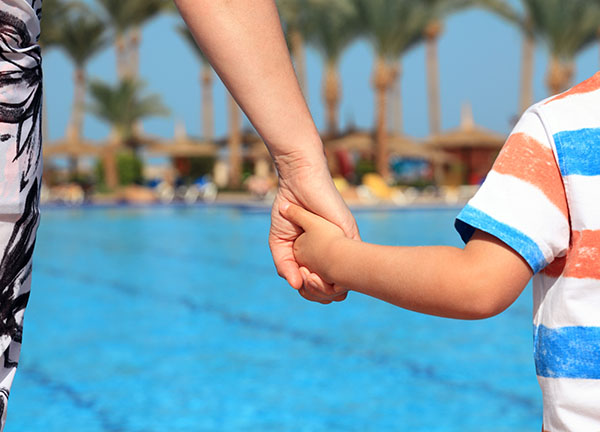Now that the kids are out for summer vacation it’s time to have some fun. Whether you have a family vacation planned for the beach, Disney World, grandparents’ house, or summer camp, be mindful of your child’s whereabouts around pool waters. Renee McCabe the Injury Prevention and SafeKids Greater Augusta Coordinator states, “Drowning is the number one killer of children under the ages of 4. However, parents can be cool at the pool and prevent tragedy with these simple steps.”
Water Safety Tips Every Parent Should Know:
• Make sure children are accompanied by an adult at all times when in or around pool areas
• Only swim in designated swimming areas
• Watch for signs of dehydration and heat exhaustion as these may lead to a potential drowning
• Never let your children swim alone, always use the buddy system
• In case of an emergency, make sure you have the necessary tools to help the child to safety. I.e. ring buoys, swim buoys and reaching polls
• If you have a pool at home make sure that you are aware of your state’s laws regarding residential pools. You can help child-proof your pool by setting up a fence around the parameters of the pool, purchasing distress alarms or pool alarms that can detect underwater movement, or by purchasing a pool cover.
• Do not let children swim or play near drains, this can become potentially fatal
“It’s Not What It Seems”: Know The Difference:
Aquatic distress is no less dangerous than a drowning victim. Someone who is experiencing aquatic distress may show many of the same signs that are associated with drowning, but it usually does not last as long. Signs of aquatic distress can include:
• Hyperventilating or gasping for air
• Tilting head back with mouth open
• Head is low in the water, with mouth at or below water level
• Hard time focusing
• Inability to move legs in a kicking motion
Contrary to popular belief, drowning is not always detected by flailing your arms in the air and screaming for help. Drowning is often quiet and may not look very serious. A person who is drowning may show signs of:
• Silence – A victim may become quiet and unable to shout for help
• Continuously holding breath under water and coming back up for air
• Inability to wave or signal because the natural instinct of the body is to press down on the water surface
• Positioning in the water may be vertical with no movement
Flotation Devices
• Make sure your children have proper-fitting, Coast Guard-approved flotation devices (life vests), and be sure your child wears them whenever they are near water
• Check the height, weight and size recommendations that are provided on the label of your life jacket
• Have your child try on the life jacket to make sure it fits snugly
• Remember, inflatable vests and arm devices such as water wings are not effective protection against drowning
As always, if you notice any of signs of possible drowning, call 911 immediately!
Attached here is a useful resource to find swimming lessons in your area:
http://www.redcross.org/take-a-class/swimming
From newborns to adolescents, kids come first at Children’s Hospital of Georgia. To find out more visit augustahealth.org/chog or call 706-721-KIDS (5437) to make an appointment for your child today.
For more info on keeping your kids safe, you can contact Safe Kids Greater August led by the Children’s Hospital at Augusta University at augustahealth.org/safekids & safekids.org.




